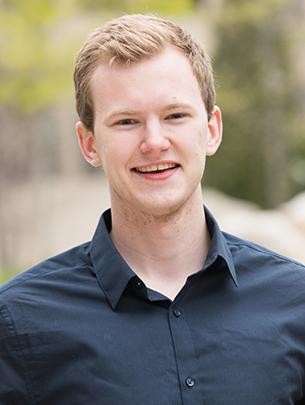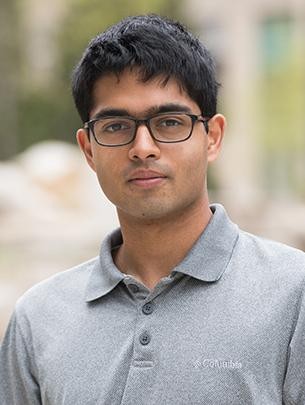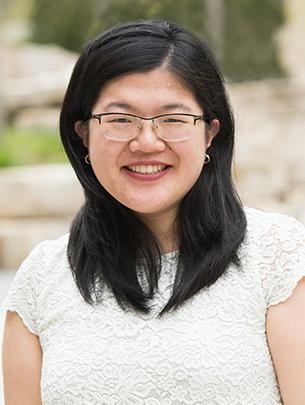Keir Adams, Nikhil Pandit and Maritha Wang, all third-year students in the College, have received prestigious Barry Goldwater Scholarships, awarded annually based on academic merit in the natural sciences, mathematics and engineering.
They are among the 496 students to earn one- and two-year scholarships—the preeminent undergraduate award of its type in these fields—which cover the cost of tuition, fees, books, and room and board up to $7,500 per year.
“We take pride in learning that the Goldwater Foundation has recognized the tremendous potential of Keir, Nikhil and Maritha,” said John W. Boyer, dean of the College. “Their academic achievements and research ambitions are exemplary of the dedication our STEM-focused students have to making a meaningful impact in their respective fields.”

A molecular engineering and chemistry major, Keir Adams has been curious about astronomy since he was young.
“My dad is a hobbyist astronomer and would call me and my siblings outside to look at the moon or the rings of Saturn through his telescopes,” Adams said. “At UChicago, my fascination with quantum mechanics and computational chemistry merged with my interests in astronomy, and suddenly I found myself simulating interstellar molecules.”
Adams has worked with Profs. Takeshi Oka and Donald York to study the chemical makeup of interstellar space. In particular, he studies a mysterious set of readings coming from unknown molecules in the Red Rectangle Nebula, developing computational models to pin down what causes them.
To cultivate his interest in renewable energy technology, Adams traveled to Scotland last summer through the College’s Chemistry Exchange Program at the University of Edinburgh. There, he developed new materials for devices called supercapacitors, which are used to store energy from renewable sources, power clean vehicles and create a sustainable electric grid.
“From an outsider’s perspective, my research interests in astrochemistry and renewable energy technologies appear remarkably dissimilar,” said Adams. “Receiving the Goldwater Scholarship has inspired me to further explore my passions and to forge my own path as a researcher, knowing that a diversity of scientific thought and experience actually strengthens my skill set and scientific creativity.”
After graduating, Adams plans to pursue a PhD in computational materials science. He’s interested in using scientific computing techniques to more quickly discover new materials for renewable energy technology. He ultimately hopes to engineer next-generation energy technologies as a university professor or government researcher.

Nikhil Pandit is a mathematics major with a research interest in symplectic geometry—a type of geometry that stems from the Hamiltonian interpretation of classical mechanics.
Pandit is participating in a research project in systolic geometry with Prof. André Neves and also conducting an independent study with Prof. Shmuel Weinberger to explore Floer homology, a tool used in symplectic geometry that relates geometric properties of a surface to counts of certain loops in the surface.
“Part of what draws me to symplectic geometry is the process of rebuilding geometric intuition in an unfamiliar setting, using techniques from diverse branches of mathematics to understand the most basic properties of these spaces,” Pandit said.
Pandit has used his skills to help tutor other students in physics and mathematics courses. This past summer, he participated in a math bootcamp, which involved dissecting and presenting on recent findings related to Plateau’s problem. Over the course of this program, he also helped design and implement two four-week courses in geometry and dynamical systems for first- and second-years.
“This experience helped me to move beyond relying strictly on textbooks for information and toward engaging directly with current research,” Pandit said. “Developing and leading courses in topics I love was truly rewarding, and I look forward to teaching as a part of my professional future as much as pursuing research.”
Pandit plans to pursue a PhD in mathematics after graduation, with hopes of becoming a professor at a research institution.

Maritha Wang developed an early appreciation for the intersection of research and engineering during a high school internship working with 2-D-materials-based composites for type 1 diabetes medical devices. By delving into scholarly research during her time at UChicago, the physics and chemistry major realized she could take her goals even further.
“The advent of 2-D materials in the last two decades has given modern society the opportunity to explore the ultimate realm of ‘small,’ placing a man-made world of micro- and nano-machines and robots within reach,” said Wang. “In my career, I aspire to contribute to this emergent field by leading a team of researchers to develop nanoscale materials and their applications.”
On campus Wang works as a research assistant for the Jiwoong Park Group, where she develops textured 2-D materials for use in flexible and foldable electronic devices. As a managing editor for Scientia, a publication of The Triple Helixat UChicago, she enjoys highlighting the diverse research efforts undertaken by undergraduates.
“In research, it is crucial that you can make your science accessible. I've always really appreciated Scientia's vision of communicating science clearly to a broader campus audience,” said Wang, who will take the helm as co-editor-in-chief next year.
Wang is also involved in science education initiatives through UChicago’s Neighborhood Schools program. She helped found an after-school science club at a middle school in Woodlawn, and she prepares lesson plans and materials for classes.
Wang plans to earn a PhD in materials science and develop materials for electronics and medical devices.
Adams, Pandit and Wang received application support from the College Center for Research and Fellowships, which guides candidates through rigorous application and interview processes for nationally competitive fellowships.